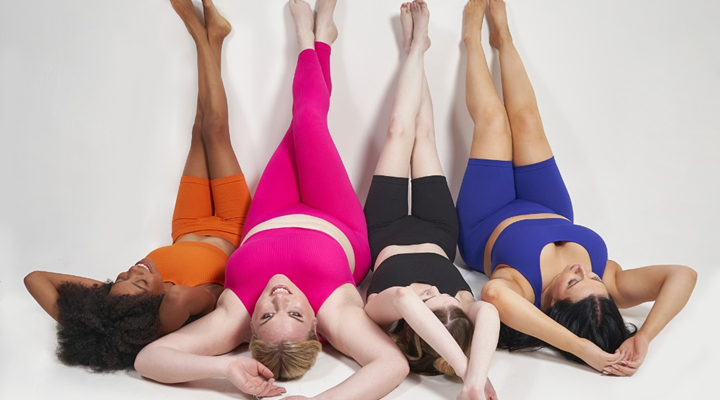The sustainable fashion market is set to become bigger and better than ever in 2024. According to market insights and consulting company Maximize Market Research, the global sustainable apparel market is valued at $6.89 billion in 2022 and is expected to grow to $11.96 billion by 2029 at a compound annual growth rate of 8.2 per cent. This market comprises a number of sectors including resale fashion, clothing rental services, and retailers with a focus on environmentally friendly fabrics and p
and production methods.
With ever-increasing consumer interest in environmentally friendly shopping practices and ongoing innovations in textile production, sustainable fashion is a promising field to enter.
One of the businesses leading the way in this space is the sustainable athleisure brand Nuttch.
Inside Retail spoke with the husband-and-wife duo behind the apparel company based in Italy to learn more about how they are working to promote sustainability within the retail industry and their upcoming plans for Nuttch.
From blog to business
Nuttch co-founder Vittoria Tomassini, a fashion and lifestyle-focused content creator, first became aware of issues regarding responsible production and questionable sustainability practices, like greenwashing, in the fashion industry through her work with a noted fashion blogger in Milan. This eventually led her to publish a book on the matter and launch Nuttch with her husband Paolo.
With Vittoria’s insider knowledge of the fashion industry and passion for creating fashionable, but still environmentally conscious clothing pieces, and Paolo’s engineering background and critical thinking skills, the two decided to launch the brand in the US, the leading market for sustainable athleisure, while producing the clothing in their home country.
Every part of the manufacturing process, from knitting and sewing the brand’s finished garments, to producing the recycled nylon yarn that is the base material of its stock, is conducted in Lombardi, Italy.
The couple highlighted the importance of working with manufacturers in this region in northern Italy, where Milan is located, for several reasons, including its rich history in the fashion industry and the advancements that its craftsmen have made with eco-friendly textiles.
Not only does Nuttch’s supplier of recycled nylon use pre-consumer waste, such as factory scraps, to create the fabric the company incorporates in its designs. But it was also the first polyamide manufacturer to achieve the EU Eco Label certification for environmental excellence.
Nuutch is not the only apparel company to be investing in Italian textile production.
Luca Sburlatim, CEO of Pattern, a stock market-listed Italian group with revenue exceeding €100 million, noted that Italian technical textile output had increased by three to four per cent in 2022 and estimated that it would expand by at least 15 to 20 per cent by 2023.
Moving into 2024, Italy is emerging as a hotbed for innovative new practices in the sustainable fashion segment.
As Tomassini stated, “We’ll keep pushing and researching for new materials and new processes to improve our operation and also to lower our impact as much as possible. I would say an accomplishment I’m really proud of is the climate-neutral certified label we just got in November. I’m very proud of the certification which I have been pushing for since the beginning.”
In addition to adding new stock-keeping units and launching into additional e-commerce and brick-and-mortar channels, the couple’s primary goal is to reach net zero emission by the end of 2024.
Renting clothes is here to stay
In addition to innovation within the textile field, another major section of the sustainable apparel market that is experiencing notable growth is the clothing rental industry.
In a study conducted by Future Market Insights, the online clothing rental market size was estimated to be worth $2.3 million in 2023 and is expected to rise to $6.2 million by 2033 at a compound annual growth rate of 10.6 per cent.
In 2009, when Rent The Runway was originally launched, the company was an innovator in the industry, as it was one of a few offering rental clothing services at such an accessible level and one of the only to do so for luxury clothing and accessory labels.
However, the rental clothing market has drastically shifted in recent years and so has Rent the Runway’s hold over the market.
Since Rent the Runway went public in October 2021, the company’s share price has fallen by approximately 97 per cent. The company reported $75.5 million in revenue in the second quarter of the year, marking a one per cent decrease from the same quarter the year prior.
Simply put, Rent the Runway has much more competition in the rental market than it had in the late 2000s, and may not be offering the versatility of stock that is needed to satisfy the trend-seeking, price-sensitive, younger consumer groups, such as Gen Z, looking for clothing rental options.
In 2018 and 2019, several companies including Express, Vince Camuto, and Banana Republic launched their own rental platforms, although they only offer their own label.
One of the strongest players in the clothing rental market is Nuuly, a clothing rental subscription service launched under the Urban Outfitters umbrella in 2019. In addition to providing labels offered in the Urban Outfitters portfolio, like Free People and Anthropologie, Nuuly also has stock that features over 400 different brands and designers.
In its fiscal third quarter ending October 31, Nuuly saw $65.5 million in revenue and an operating profit of $300,000. Just a year prior, the company had only posted $35.3 million in revenue, showing its rapidly growing hold in the market.
As we move into the next year, the sustainable apparel industry is ripe for expansion.

